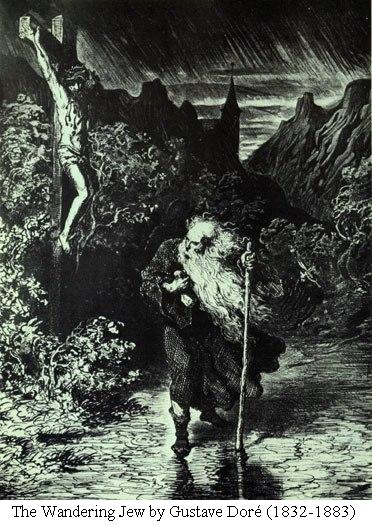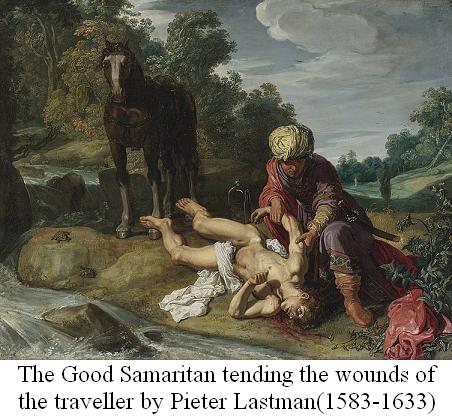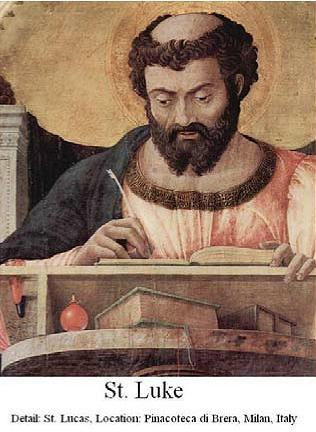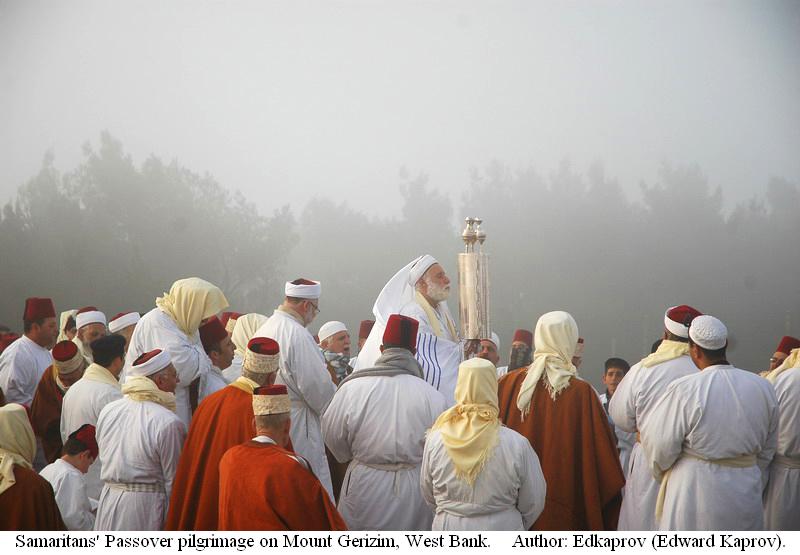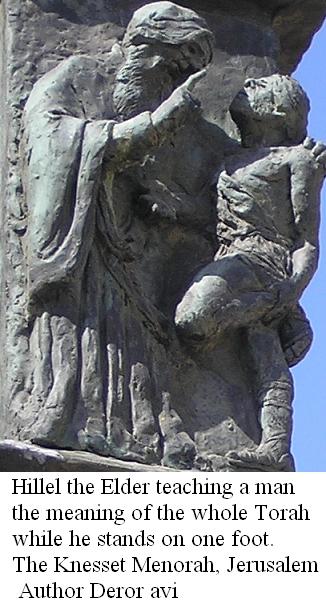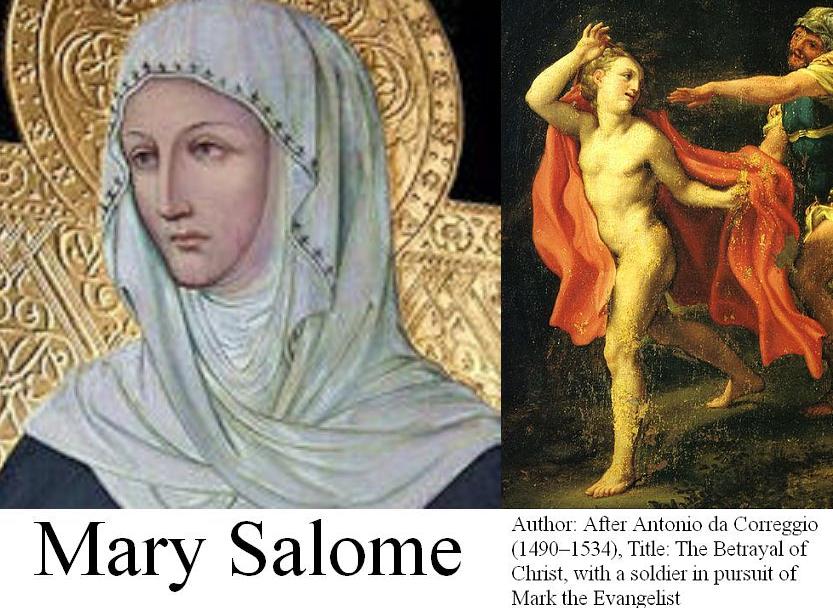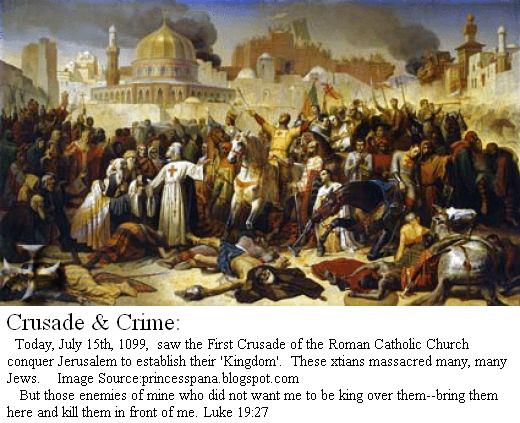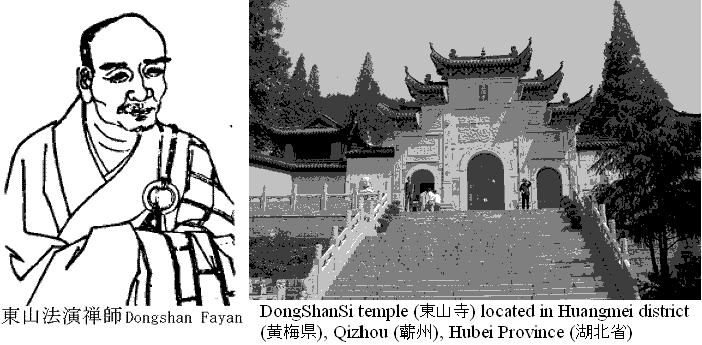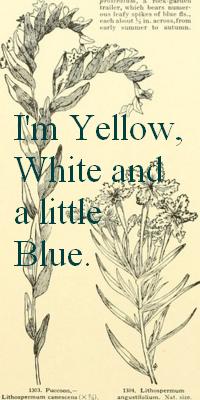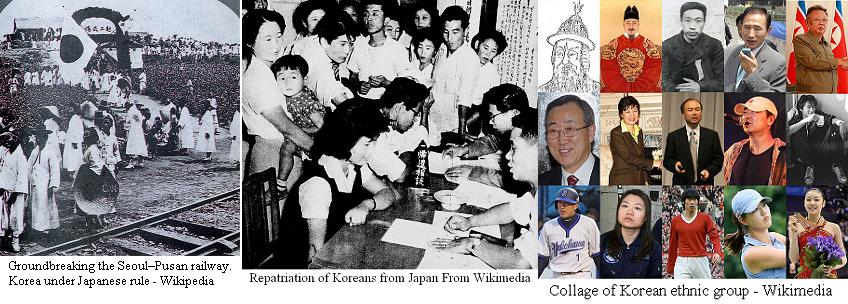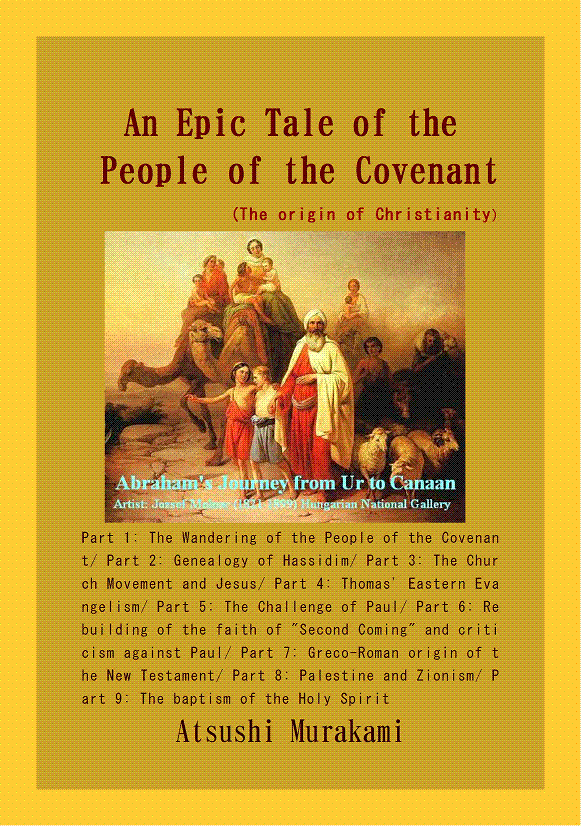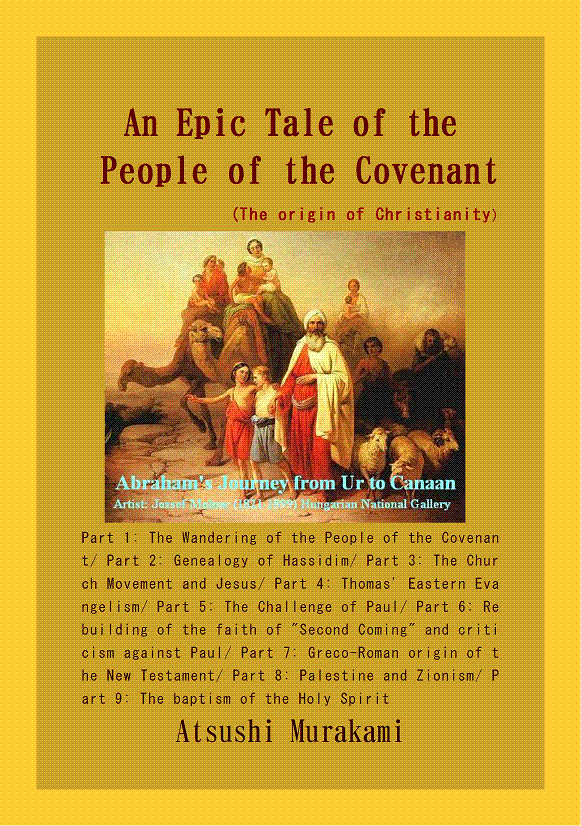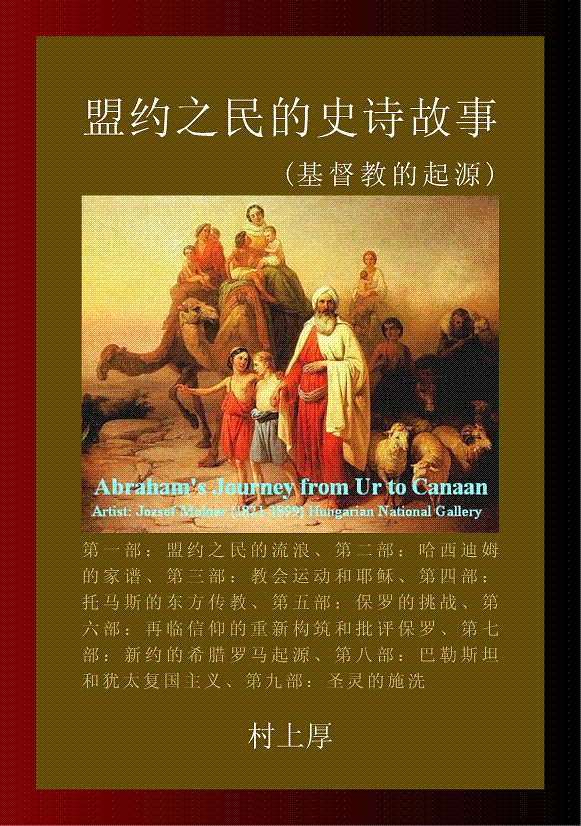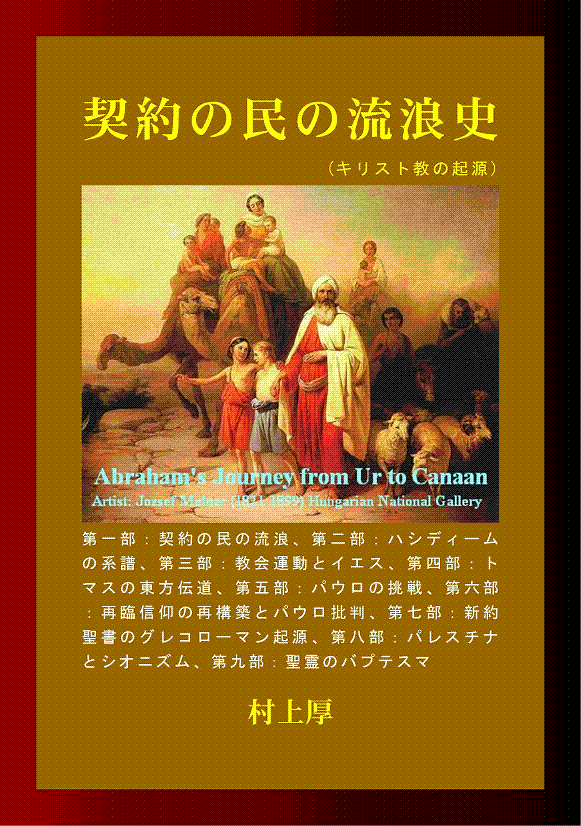Review:The baptism of the Holy Spirit (Love your neighbor as yourself)
On the way to the hill of Golgotha carrying the cross, Jesus exhausted and stopped by the door of a Jewish cobbler called Ahasverus and asked him a cup of water. But the Jew drove him along wickedly with these words: "Go, go you tempter." Then Jesus kept his eyes on Ahasverus for a while and answered him, "I will go but you must walk arownd the earth and never rest until my second coming in the Last Judgement." It is said that Ahasverus, who had been exiled from his native country, was witnessed all over Europe until the 18th century, which was even after one thousand and some hundreds of years later from it. The Parable of the Good Samaritan
On one occasion an expert in the law stood up to test Jesus. "Teacher," he asked, "what must I do to inherit eternal life?" "What is written in the Law?" he replied. "How do you read it?" He answered, "'Love the Lord your God with all your heart and with all your soul and with all your strength and with all your mind'; and, 'Love your neighbor as yourself.'" "You have answered correctly," Jesus replied. "Do this and you will live."
But he wanted to justify himself, so he asked Jesus, "And who is my neighbor?" In reply Jesus said: "A man was going down from Jerusalem to Jericho, when he was attacked by robbers. They stripped him of his clothes, beat him and went away, leaving him half dead. A priest happened to be going down the same road, and when he saw the man, he passed by on the other side. So too, a Levite, when he came to the place and saw him, passed by on the other side. But a Samaritan, as he traveled, came where the man was; and when he saw him, he took pity on him. He went to him and bandaged his wounds, pouring on oil and wine. Then he put the man on his own donkey, brought him to an inn and took care of him. The next day he took out two denarii and gave them to the innkeeper. 'Look after him,' he said, 'and when I return, I will reimburse you for any extra expense you may have.' Which of these three do you think was a neighbor to the man who fell into the hands of robbers?" The expert in the law replied, "The one who had mercy on him." Jesus told him, "Go and do likewise." (Luke 10:25-37)
Far sight and deep design of Luke?
The Parable of the Good Samaritan exists only in the Gospel of Luke but does not in the other three (Mark / Matthew / John) Gospels. However, the first half of the dialogue between Jesus and the scribe on one's neighbor is also introduced in the Gospels of Mark and Matthew but in different contexts.
In the Gospel of Luke, the scribe appears after an article that Jesus appointed another 72 missionaries, after choosing the Twelve Apostles, dividing them into two-person teams in order to fan out ahead of him into every town and place he intended to go. In the Gospel of Mark (12:28-34) and in the Gospel of Matthew (22:35-40), Jesus, who had entered Jerusalem riding on a donkey as the king of Israel, led the masses, marched through the streets and expelled merchants in the temple, answered first to the chief priest, the teachers of the law and the elders and followed by those of the Pharisees and the Herodians. Then the scribe appeared.
And in the Gospel of Mark and in the Gospel of Matthew, it is not the scribe who answered, but Jesus himself, saying, "The most important commandment is this: 'Listen, O Israel! The Lord our God is the one and only Lord. And you must love the Lord your God with all your heart, all your soul, all your mind, and all your strength.' The second is this: 'Love your neighbor as yourself.' There is no commandment greater than these."
The original text of the first commandment recorded in Deuteronomy 6: 4-5 is as follows. "Hear, O Israel: Jehovah our God is one Jehovah: and thou shalt love Jehovah thy God with all thy heart, and with all thy soul, and with all thy might."
The second commandment is the Leviticus 19:18 and is written as follows; "Do not seek revenge or bear a grudge against anyone among your people, but love your neighbor as yourself. I am the Lord."
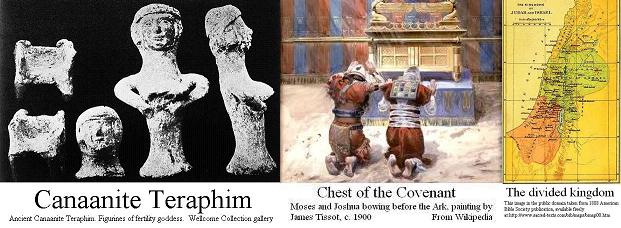
At the time when Leviticus was compiled, Israel had probably just completed to organize the union of 12 to 14 tribes or had been in the process of forming that union and Moses and his successors would have been plagued by discord among the tribes who still had retained their traditions of the faith of different patron gods. Therefore it seems to have warned that they should love their neighbor (other tribes than their tribe itself) as theirselves and even if the discord among the tribes occurs, it should not cause a chain of revenge. Just as expected, the most of the 12 tribes revolted after Solomon's death and founded the North Kingdom of Israel, which enjoyed the prosperity over the southern kingdom of Judah. After the Northern Israel Kingdom was overthrown by Assyrian invasion, the Southern Kingdom of Judah managed to survive through the tightrope diplomacy allying with one of the two major powers of Assyria and Egypt to cope with the other's threat and tried to maintain religious centripetal force by religious reform based on Moses' fifth book "Deuteronomy." Thus Deuteronomy 6: 4-5 emphasizes that "the Lord of Israel is one."
Therefore, it is clear that "your neighbor" is limited to the people of Israel who believe in the god of Israel, that is, Yahweh. The scribe, who appears in Luke Chapter 10 Verse 25-37, is fully aware of such things but dares to ask Jesus "Who is my neighbor?" Apparently, it seems that far sight and deep design of Luke is hidden behind of Jesus' teaching regarding to 'Who is one's neighbor?' through 'The Parable of the Good Samaritan.'
Origin of the Samaritan
Both Judah and Samaria were originally parts of the kingdom of Israel, ruled by David and Solomon. However, when Rehoboam, the son of Solomon, succeeded to the throne after Solomon 's death, the most of the 12 tribes revolted and founded Northern Kingdom of Israel with Samaria as its capital. On the other hand, two tribes, Judah and Benjamin and some part of the Levi backed the son of Solomon and founded the Kingdom of Judah with Jerusalem as its capital. After all, both countries were destroyed one after the other but the inhabitants of Samaria built a temple on Mount Gerizim in the era of Alexander the Great and established their own Judaism.
Under these circumstances, the native Jews, mainly tribe of Judah, have looked down Samaritans and avoided associating with them even in the days of Jesus.
Jesus and Paul's relationship with Essenes
It is Rabbi Hillel, the leader of the Pharisees, who preached "The love of God and the love of one's neighbor are one: that is the whole Torah," and the sect of Essenes is said to have been organized by the supporters of Rabbi Hillel. Paul, who described himself a Pharisee, studied to Gamaliel, the grandson of Hillel.
The Essenes did not certify the authority of the incumbent priests who catered to the Celeucusian and Roman rules and the temple under their control. On the other hand, Jesus' younger brother James, who led the Jerusalem Church, is said to have entered into the holy areas of the Temple to function as "high priest" to his followers, as the legitimate lineage of priests representing both the Davidic royal family as well as a priestly Aaronic Lineage.
Around that time, Paul perceived a plot made by the Jews against him after the argument regarding his missionary work in the province of Asia. The incident had estranged him from the members of the Synagogue of Freed Slaves and the mainstream of the Jerusalem Church. He discussed the countermeasure with St. Luke and returned to Jerusalem together with a big cheering squad consisting of representatives of Hellenist believers. However, Paul was dragged out from the temple and was nearly killed. But he was snatched from the jaws of death. Because Roman army rescued him.
Incidentally Jesus shared the Last Supper with his 12 Apostles at the second floor of meeting place of the Essenes, next to the house of Caiaphas, the High Priest. The owner of the meeting place Mary Salome said to Jesus, "Who are you mister? You have climbed onto my couch and eaten from my table as if you are from someone." (Thomas 61) Could not it have been the evangelist John Mark, the son of Salome, that there was leaning on Jesus' bosom one of his disciples, whom Jesus loved, at the Last Supper. (John 13:23) The author of The Gospel of John seems to have superimposed himself with John Mark as both of them shared the same first name.
Samaritans are the very our neighbors
In any case, it is understandable that Mark, the son of the landlady of Essenes' meeting place, made "the love of one's neighbor" the most important commandment same as "the love of God." The Gospel of Matthew almost completely inherits the description of the Gospel of Mark. But the Gospel of Luke not only introduces it in different situation but also let the scribe but not Jesus speak out the most important commandments and farther more let Jesus preach the parable of the Good Samaritan and explain that the Samaritan, who cared the traveler attacked and injured by the robbers, was the very his neighbor more than the priest or the Levite (Jews), who abandoned him. However, this far sight and deep design of Luke seems to have contributed to the catastrophe for Jews in later.
Wandering Ahasverus
On the way to the hill of Golgotha carrying the cross, Jesus exhausted and stopped by the door of a Jewish cobbler called Ahasverus and asked him a cup of water. But the Jew drove him along wickedly with these words: "Go, go you tempter." Then Jesus kept his eyes on Ahasverus for a while and answered him, "I will go but you must walk around the earth and never rest until my second coming in the Last Judgement." It is said that Ahasverus, who had been exiled from his native country, was witnessed all over Europe until the 18th century, which was even after one thousand and some hundreds of years later from it.
According to a paper recorded in the 'KeiO Associated Repository of Academic resources,' which was published in 1968 by Mr. Hidenao Arai (荒井秀直1933-), who also served as an honorary professor at Keio University (慶応義塾大学), under the background of Jewish persecution by the Crusaders in the early 11th century, similar fables based on the "Wandering Jew" appeared in various parts of Europe from the early 13th century. After a German church issued a pamphlet entitled 'A Jew, named Ahasverus' in 1602, the story of 'Wandering Ahasverus' seems to have spread not only in Germany but also in the whole world. And the feature of this story is that there is a lack of 'salvation' as a fundamental idea of Christianity, according to the article.
Jews are the very neighbors for Andersen
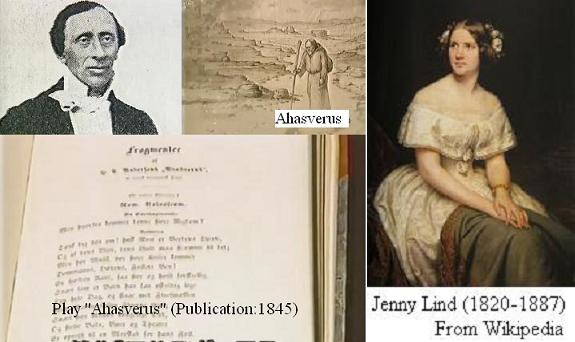
Time passed to the year 1805, a year after Napoleon became the French emperor, Andersen was born as a child of a poor shoemaker in Odense, Denmark, but lost his father at the age of seven. After his mother, who had supported the family as a washerwoman, remarried, he made money by imitating street performers. Fortunately, he was recognized as a talented boy soprano and was admitted to the Royal Danish Theatre at Copenhagen at the age of 14 years. Although six months later his hope to become a performer was broken due to voice change, he won the sponsorship of Jonas Collin, director of the Royal Danish Theatre, after writing a puppet show script and entered Latin grammar school at the age of 17 and advanced to the University of Copenhagen. But as Jonas Colin broke up relationship between Andersen and his second daughter, Luise Colin, Andersen was disappointed and fled to Italy and wrote the autobiographical novel "Improvising Poet." Andersen got a pension with the help of Colin again and wrote "The Mermaid Princess" etc. However, when his courtship refused by diva Jenny Lind, who was 15 years younger than him, he despaired again and went on a journey of exile as if he had been the Wandering Jew. Andersen, who published the play 'Ahasverus' at the age of 40, is said that he became friends with a few Jewish families in his later years and closed his life at the age of 70.
Who Is That?
One day, Dongshan Fayan (東山法演1024-1104), one of the great Zen masters during the Northern Sung Dynasty (北宋960-1127) in China, who served as the abbot of a temple called DongShanSi temple (東山寺) located in Huangmei district (黄梅県), Qizhou (蘄州), Hubei Province (湖北省), said to the assembly, "Even the founder of Buddhism Shakyamuni (釈迦牟尼) Buddha and Maitreya Buddha (弥勒菩薩), who is supposed to descend and to save the world 5,670 million years after Shakyamuni's death, are merely someone's slaves. Tell me, who is that?"
Jesus also said, "The man old in days will not hesitate to ask a small child seven days old about the place of life, and he will live. For many who are first will become last, and they will become one and the same." The old man is socially respected as the wise man familiar with Jewish law. In contrast, a small child seven days old is not yet circumcised and so not qualified as a Jew or even as a man. It symbolizes primitiveness. As it means that the true wise men find the place of life or Kingdom of Heaven in the simple and boring things at first glance like stones and sticks and will become 'one and the same.' To become 'one and the same' means to become 'the Holy One (Autogenes), ' which is not dependent on anyone and is beyond the Creator.
In the Gospels of Mark, Matthew and Luke, too, Jesus teaches his disciples to accord little children priority over wise men. The Gospel of Thomas repeatedly use the keyword 'the Holy One' and emphasizes the need to return to the primitiveness which has not been split into male and female but one with God.
Wumen Huikai(無門慧開1182-1260), who is known as one of the fifth generation disciples of Fayan-Chanshi and wrote "Wumenguan (無門関Gateless Barrier)", an analects of Koan during the Southern Song Dynasty (南宋1127-1279), commented this koan (Wumenguan Case 45), "If you can see that one clearly, it will be like bumping into your own father at a crossroads; you don't have to ask anyone else whether or not that's the one." He also gave us very kind advice in his following verse; "Don't draw another's bow, Don't ride another's horse, Don't discuss others' errors, Don't mind others' business."
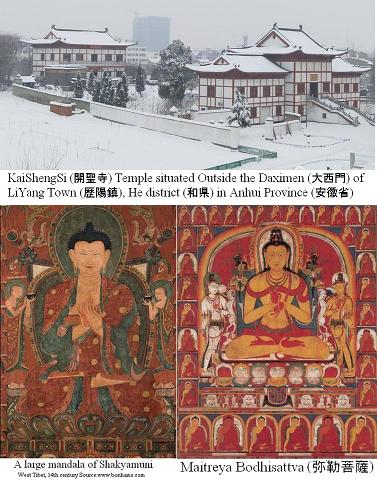
Each Fayan-Chanshi's disciples was called to his room and stated their views. These procedures in practice of Zen are called 'Nisshitsu(入室)' and 'Sanzen(参禅).' At that time, KaiShengJueChu-Chanshi(開聖覚初禅師), known as the ancestor who rejuvenated KaiShengSi (開聖寺) Temple situated Outside the Daximen (大西門) of LiYang Town (歴陽鎮), He district (和県) in Anhui Province (安徽省), had also stayed in DongShanSi Temple on the way of pilgrimage. JueChu-Chanshi was respected and called 'Jue-lao (覚老).' When Jue-lao entered his room, FaYan-Chanshi immediately asked with a loud voice, "Even Shakyamuni and Maitreya are merely someone's slaves. who is that?" Then, Jue-lao answered, "Hu-ZhangSan(胡張三), Hei-LiSi(黒李四)." Both Zhang (張) and Li (李) are common surnames. ZhangSan means Zhang family's third son. LiSi means Li family's fourth son. And before the People's Republic of China promoted the "One Child Policy," wherever you walked on the road, you met with Zhang family's third son and Li family's fourth son. So, ZhangSan-LiSi also meant a mean ordinary man. Hu (胡barbarian) means Dharma, that is, the founder of Zen Buddhism and Heilian (黒:Black face) means Sakyamuni, that is, the founder of Buddhism. When FaYan-Chanshi heard Jue-lao's view, he grinned and said "OK, you passed." However, the head monk of DongShanSi Temple, YuanWu KeQin (圓悟克勤1063-1135) chanshi, who compiled "The Blue Cliff Record (碧巌録)," advised FaYan-Chanshi, "His view seems to be good. But I would like to let him sweat a little more." FaYan-Chanshi answered, "You can say that again." and next day, when Jue-lao entered his room, he once again asked him, "Who is that?" When Jue-lao said, "I didn't answer yesterday, did I?" he urged "At any rate, answer again." Then Jue-lao once again answered, "Zhang family's third son, Li family's fourth son." But FaYan-Chanshi said, "No good." Jue-lao protested, saying, "But you yesterday didn't say 'OK. You passed' did you?" But FaYan-Chanshi said, "Yesterday is yesterday, today is today." Jue-lao heard this and realized. By the way, YuanWu KeQin Chanshi's Chinese courtesy name (name formerly given to adult Chinese men, used in place of their given name in formal situations) is also JueChu (覚初).
Sakyamuni attained spiritual awakening under the Bodhi tree and testified, 'Holy am I alone throughout heaven and earth. Grass, trees and the domains of all living things, all attain buddhahood.' If you go beyond time and space and enter the absolute situation of being integrated with the universe, there is only one, and grass, trees and the domains of all living things are contained in yourself, so if you become a Buddha, the whole world will become a Buddha. However, in this relative world, the guest and host (objects and subjects) are obvious, and the whole world is changing from time to time. So in your family, today if your wife is 'that,' then tomorrow your daughter may be 'that.' And in your company, today if your section chief is 'that,' then tomorrow the new staff in charge of serving tea, may be 'that.'
Jesus said, "You have heard that it was said, 'Love your neighbor and hate your enemy.' But I tell you: Love your enemies and pray for those who persecute you, that you may be sons of your Father in heaven. He causes his sun to rise on the evil and the good, and sends rain on the righteous and the unrighteous."
"I'm Yellow, White and a little Blue"
A new book "I'm Yellow, White and a little Blue" written by Ms. Mikako Brady, a Japanese woman living in the UK, was recently introduced on the NHK Journal podcasting.
The book seems to depict the secondary school life of a son born between her and Irish her husband. The son is sometimes confused, but he is finally happy to adapt to the school life, although he must be socialized with various children, such as students who are racist, poor and struggling to buy school uniforms, suffered from gender identity issues and more.
In this school, according to her, the teachers often say during the class that "It is the age of empathy," and the school offers 'sex education,' including LGBTQ, 'citizenship education' and 'children's rights treaty education,' etc. It's so British!
According to Ms. Mikako, sympathy is an emotional action that someone sympathizes with people of similar circumstances, but empathy is an intellectual action that someone thinks from the standpoint of the other person with different circumstances and positions. This reminds us of Jesus' teaching, "Love your neighbor as yourself." He preaches, "No other commandment is greater than this." (Mark 12:31)
Japanese also need to learn! ?
With whispering about the threat of Neo-Isolationism and Neo-Nazism and the recent change of East Asia situation, the word 'Zainichi' has flown around the net media in Japan. Adding 'American' or 'British' after this word such as 'Zainichi Amerikajin (在日アメリカ人:Americans in Japan)' or 'Zainichi Eikokujin (在日英国人:British people in Japan),' there is nothing special and no problem at all. However, when this word is used alone without classification of foreigners by nationality, it is reminiscent of the third category foreign residents in Japan just after the end of the second world war. The third category foreign residents means non-Japanese and non-American residents. Speaking of the third category foreign residents at that time, most were Koreans and Chinese.
Initially the net right wing used this word to attack the left wing and the anti-mainstream, but the situation has changed recently. The word has been used to attack the right wing and the mainstream factions. According to them, a certain former prime minister is a descendant of the Koreans who were brought from Korea when Toyotomi Hideyoshi (豊臣秀吉) twice invaded Korea and a certain conference, of which chief advisor is a former prime minister and members include most Conservative MPs, and certain religious organizations and even Japanese royal family too, are also 'Zainichi.'
Certainly, the Jomon people (縄文人: native Japanese lived in 16,000–3,000 years ago) might have been Siberian hunters who came after Mammoth during the Glacial Age, and the Yamato Imperial Court (大和朝廷) might have been an equestrian people that invaded Japan via the Korean Peninsula. In general, Japanese is an immigrant group carrying different genes, and there is no purebred Japanese.
Japan-China relations, Japan-Korea relations and immigration issues should be actively discussed, but the word 'Zainichi,' which has a discriminatory image right after the war, can not be accepted. We may also need to return to secondary school again and learn about 'Empathy.'
And if believers of Judaism, Christianity, Islam, Buddhism, and other religions and atheists too, learn about 'Empathy' once again, the Middle East conflict and the global trade problems that we are facing now, should be able to resolve.<To be continued>
[Reference] 《The Gateless Barrier》 CASE 45: Who Is That One?
Case:
Master and Patriarch En of Tozan said, "Even Shakyamuni and Maitreya are servants of that one. Just tell me, who is that one.
【Commentary】 If you clearly recognize that one, it will be just like meeting your own father at the crossroads. It is not necessary to ask others whether it is he or not.
【Verse】 Don't draw another's bow;
Don't ride another's horse;
Don't speak of another's faults;
Don't inquire into another's affairs.
《Taisho shinshu daizokyo(大正新修大藏経)》/《ZhiYueLu(指月録)》
KaiShengJueChu-Chanshi(開聖覚初禅師), from He (和) district, one day visited WuZuFaYan-Chanshi (五祖法演禅師) on the way of pilgrimage. FaYan asked him, "Even Shakyamuni (釈迦牟尼) and Maitreya (弥勒菩薩) are servants of that one, Just tell me, who is that one?" Jue answered, "HuZhangSan (胡張三)HeiLiSi (黒李四)." FaYan admitted this answer. YuanWu (圓悟) had been in charged of the head monk of the temple at that time. FaYan showed him Jue's answer. Wu said, "It looks OK. However, unfortunately it seems to have not shot the center of target. It is not good to leave it. How about you judge after letting him answer again?" So next day, FaYan asked him the same question when Jue entered his room. Jue said, "I didn't answer yesterday, did I?" FaYan said "What did you say?" Jue said, "HuZhangSan HeiLiSi" FaYan said, "No good. You made a mistake." Jue asked, "Why did you say 'OK' yesterday?" FaYan said, "Yesterday you passed but today you failed." Jue heard it and realized.
What is "Baptism with The Holy Spirit"?
According to the dialectic of the Gospel of John,
【Thesis】"A man can possess eternal life through accepting testimony of the Son of man and being baptized by him." (John 5:24)
【Anti-thesis】But "The one who comes from the earth cannot accept the testimony by one from heaven." (John 3:32)
How then can a man possess eternal life?
【Synthesis】"If you want to be baptized with the Holy Spirit, you can just go back to the word which was with God in the beginning (John 1:1) and certify that God is truthful. (John 3:33)"
When he said, "You are Huichao," Zen Master Fayan thrusted vivid Self in Huichao in front of his eyes.
Purchase here One world:AD-SEAnews
Your Comments / Unsubscribe
SEAnews Twitter
SEAnews Messenger
SEAnewsFacebook
SEAnews eBookstore
SEAnews world circulation

